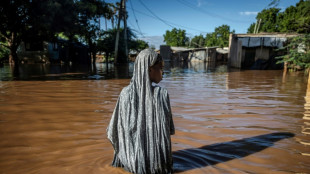

UN climate talks chief pushes for rapid deal
The head of UN climate talks pressed nations Friday to move fast to deliver an "unprecedented" pact on tackling global warming, as negotiators scrambled to bridge differences over phasing out fossil fuels.
While UN climate talks rarely finish on time, COP28 president Sultan Al Jaber has set the ambitious goal of wrapping up the summit in Dubai on schedule at 11 am (0700 GMT) on Tuesday.
With ministers now in town, Jaber said he wanted negotiators to produce a new draft deal on Friday.
Despite disagreements over the future of fossil fuels, Jaber voiced optimism that the talks hosted by the oil-rich United Arab Emirates can finish with a historic agreement.
"We have the potential to deliver a paradigm shift," he said Friday after delegations from nearly 200 nations took a breather the day before.
"Let us please get this job done. I need you to step up and I need you to come out of your comfort zones," he said.
Climate campaigners have viewed Jaber -- head of UAE national oil firm ADNOC -- with deep suspicion, but he has sought to assure sceptics by stating that a phase-down of fossil fuels was "inevitable".
COP28 kicked off last week with the landmark launch of a loss and damage fund for nations devastated by climate change.
"We have surprised the doubters and inspired the optimists," Jaber said, telling reporters later that he was "positive, hopeful and optimistic".
"I also feel a sense that something unprecedented is possible to happen here at COP28," he said.
A handful of countries, including oil giant Saudi Arabia and major crude consumer China, have resisted the inclusion of language on a phase-out of fossil fuels in the final text.
- 'We can do this' -
A draft deal was released on Tuesday but negotiators failed to produce another text on Wednesday before heading into the break.
Tuesday's document contains three options on fossil fuels.
The first calls for an "orderly and just" exit from hydrocarbons.
The second says countries must accelerate efforts towards the phase-out of "unabated" fossil fuels -- those whose emissions cannot be captured -- and "rapidly" reduce their use to achieve net-zero CO2 in energy systems by around 2050.
US climate envoy John Kerry repeated on Wednesday that carbon capture technology was key to efforts to phase out fossil fuels -- a hint that Washington might be leaning towards the second option.
The third and most controversial option effectively proposes not addressing the issue at all.
Scientists warn that greenhouse gas emissions -- the bulk of which come from burning fossil fuels -- must fall by 43 percent by 2030 for the world to reach the goal of limiting warming to 1.5 degrees Celsius.
Despite the debate over fossil fuels, some governments have voiced optimism that COP28 can deliver an ambitious deal.
"After hours and hours of conversations with parties, I really mean it when I say I believe we can do this. I believe it is possible," said Denmark's Dan Jorgensen, one of the climate ministers tasked with leading the talks.
- 'Keep carbon in the soil' -
Saudi Arabia has been the most vocal nation against a phase-out or even a phase-down of fossil fuels.
"As one of the largest producers of hydrocarbons, they refuse to have a solution imposed upon them," Umar Karim, an expert on Saudi politics at the University of Birmingham, told AFP.
Kristian Ulrichsen, a Middle East fellow at Rice University, said Saudi Arabia would seek a coalition with like-minded countries on fossil fuels, including China and Russia.
But other observers said China is playing a constructive role at the talks.
While the country is the world's biggest emitter of greenhouse gases, it is also the top producer of renewable energy.
Activists held another protest at the sprawling COP28 venue Friday to demand an end to fossil fuels, chanting "no coal, no oil, keep the carbon in the soil!"
Y.Theisen--LiLuX



